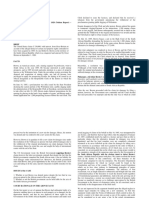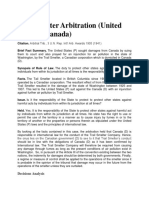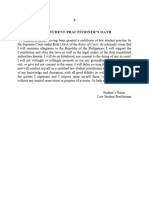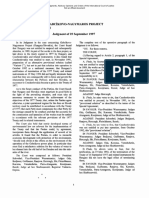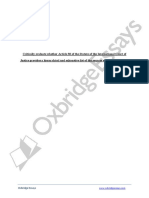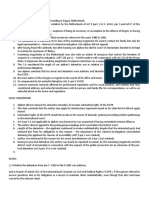Gender and The Law Final
Gender and The Law Final
Uploaded by
Gela GaffudCopyright:
Available Formats
Gender and The Law Final
Gender and The Law Final
Uploaded by
Gela GaffudOriginal Title
Copyright
Available Formats
Share this document
Did you find this document useful?
Is this content inappropriate?
Copyright:
Available Formats
Gender and The Law Final
Gender and The Law Final
Uploaded by
Gela GaffudCopyright:
Available Formats
GENDER AND THE LAW
Krissi Shaffina Twyla A. Rubin
The course seeks to introduce students to feminist legal theory, discussing critical perspectives on institutions,
particularly the law and the legal system and their role in maintaining and perpetuating gender inequalities. The course
provides a critical view of the law, discussing the role of feminist and women’s movements in the development of
international and domestic protection of women’s human rights and the continuing challenges. Through international and
domestic case law bourne of feminist struggles, discussions on special issues and concerns of women will be undertaken
such as rape, reproductive health and rights, sexual harassment, and abortion. The latter part of the module will include
discussions relating to sexual orientation, gender identity and expression and sex characteristics as they are regulated by
the law and legal systems. Students are expected to reflect on the development of gender related legislations and their
implementation, critically assessing the country’s progress against structural and cultural barriers to women’s equality
and empowerment and equal dignity of persons regardless of SOGIESC.
Course Objectives
1. Discuss feminist perspectives of the law and critically analyze the role of law in maintaining and perpetuating
gender inequality;
2. Trace the role of feminist and women’s movements in the development of women’s international and domestic
women’s human rights law and the related critiques and developments;
3. Critically discuss the role of women’s and feminist movements in developing international and domestic
feminist jurisprudence and the continuing challenges and barriers;
4. Exercise feminist analysis of key legislations of the Philippines from development to implementation and
feminist analysis of recent jurisprudence;
5. Draft a critical paper drawing on feminist analysis of the law as applied to current issues, contexts, or other
interest in the field law
Week Learning Outcome Session
1 Introduction to the Course and Diagnostic Exam
For students to understandRethinking
law Law, the Legal System, and Legal Reasoning
as gendered and as the
language of power
For students to understandFeminist
the Theories and the Law
histories, strands of
feminist legal theory
and their manifestation
in law
Feminist Theories and the Law
For students to understandFeminist Engagement with International Human Rights Law
feminist engagement
CEDAW and the OP CEDAW
with internationalGeneral
law Recommendations
and the role of
women’s movement in
the development of
women’s rights as
human rights
Understand the impact
Feminist Legal Theory and Practice in the Philippines
of feminist
engagement with the
law in domestic and
International Jurisprudence and Transnational Feminist Movements (KTV, R, and
international settings RH Inquiry in Manila)
Philippine State Report to CEDAW
Shadow Reports
Understand continuing debate
Feminist Critique of Rights: Compliance and Resistance
and feminist critique
of human rights
Mid-term Exams
Exercise feminist analysisGender
of Based Violence
key legislations of
RA the8353; RA 9262; RA 9710 and related Supreme Court cases
Philippines from
development to
implementation and
feminist analysisReproductive
of Health and Rights
recent jurisprudence
RA 10354 and related Supreme Court Cases
Marriage and Family
The Family Code and related Supreme Court Cases
Divorce, Nullity, Marriage Equality
Magna Carta of Women and measures addressing women in the marginalized
sectors: women in armed conflict, Indigenous women, WEDC etc
Apply feminist analysis inSOGIESC
the under the law, the long journey of the Anti-Discrimination Bills
understanding of
challenges in relation
to discrimination on
the basis of SOGIESC
Critically discuss aims gender
From women’s rights to Gender Justice
justice in the context
of feminist and
LGBTI engagement
with the law and the
legal system
Final Exams
Grading System and Class Requirements:
40% Class Participation: 10% attendance and 30% Recitation
30% Written Mid-term Examination
30% Final Paper, 2,500-word essay exclusive of Bibliography
REFERENCES FOR WEEK 2:
Rethinking Law, the Legal System, and Legal Reasoning (Week 2)
Davies, M. ‘Flat Law Theory’, Feminist Legal Studies (2008) 16: 281-314.
Finley, Lucinda. Breaking Women's Silence in Law: The Dilemma of the Gendered Nature of Legal Reasoning.
http://digitalcommons.law.yale.edu/cgi/viewcontent.cgi?article=5010&context=fss_papers
Women’s Legal and Human Rights Bureau. Feminist Legal Advocacy in the Philippines: Defining A Framework
Women’s Exclusion from the Legal Profession (Memo Notes)
https://ww3.lawschool.cornell.edu/AvonResources/Memo-Womens-exclusion-from-the-legal-profession.pdf
Jurisprudence:
In re Goodell, 39 Wis. 232 (1875)
Bradwell v. The State, 83 U.S. 130 (1872)
Feminist Theories and the Law (Week 3-4)
Tong, Rosemarie “Feminist Thought”, chapters 1-8
Group Reporting on Feminist Strands
Carol Hanisch “The Personal Is Political” http://www.carolhanisch.org/CHwritings/PIP.html
K.S. Twyla Rubin Decolonizing Feminist Legal Theories
Feminist Engagement with International Human Rights Law (Weeks 5)
Thailand Institute of Justice Women’s Access to Justice: Perspectives from the ASEAN region (pages 21-38)
Chinkin and Freeman, Towards a Convention on Elimination of Discrimination Against Women, CEDAW Annotated
(p.1-33);
Byrnes, Andrew, Article 1, CEDAW Annotated (pp 52- 70)
Feminist Legal Theory and Practice in the Philippines (Week 6)
Hega, Alporha, Evanghelista. Feminism and the Women's Movement in the Philippines: Struggles, Advances, and
Challenges
Women’s Legal and Human Rights Bureau, Feminist Legal Advocacy in the Philippines: Defining A Framework
International Jurisprudence and Transnational Feminist Movements (Week 7)
CEDAW, Articles 2,5,
Vertido vs. Philippines, CEDAW Communication No. 18/2008
RBP vs. Philippines, CEDAW Communication No
RH Inquiry in Manila
Jurisprudence:
Philippine State Report to CEDAW (scan State Report 2016)
Shadow Reports – Read at least one shadow report from CSOs during the 2016 CEDAW
Feminist Critique of Rights: Compliance and Resistance (Week 8)
Hilary Charlesworth, Christine Chinkin and Shelley Wright, Feminist Approaches to International Law
K.S. Twyla Rubin Dream Deferred
Gender Based Violence (Week 9)
DEVAW (definition of violence against women)
General Comment 19 (Violence Against Women)
CEDAW General Comment 33 (Access to Justice), CEDAW General Comment 35 (Gender Based Violence)
RA 8353; RA 9262; RA 9710 and related Supreme Court cases
Reproductive Health and Rights (Week 10)
RA 10354 and related Supreme Court Cases
RH Inquiry in Manila (CEDAW)
Marriage and Family (Week 11)
The Family Code and related Supreme Court Cases
Divorce, Nullity, Marriage Equality
Magna Carta of Women and measures addressing women in the marginalized sectors: women in armed conflict,
Indigenous women, WEDC etc (Week 12)
Magna Carta of Women (RA 9710), Articles 9 (Protection from Violence),
SOGIESC under the law, the long journey of the Anti-Discrimination Bills (Week 13)
Yogyakarta Principles
Draft Anti-Discrimination Bill on the basis of SOGI
From women’s rights to Gender Justice (Week 14)
Musculinities
You might also like
- Asylum Case (Colombia v. Peru) NFDocument32 pagesAsylum Case (Colombia v. Peru) NFJereca Ubando JubaNo ratings yet
- Hodges v. Salas, 63 Phil. 567Document7 pagesHodges v. Salas, 63 Phil. 567Krista YntigNo ratings yet
- Regalado V RegaladoDocument11 pagesRegalado V RegaladoJay RibsNo ratings yet
- Bailiff 1Document3 pagesBailiff 1Sonny Paul CirunayNo ratings yet
- RA 8042, As Amended by RA 10022Document28 pagesRA 8042, As Amended by RA 10022Camille EspeletaNo ratings yet
- U.S.v Great BritainDocument3 pagesU.S.v Great BritainMichelle Montenegro - AraujoNo ratings yet
- SPC - Aranas - G.R. No. 158370 - Spouses Uy v. ArizaDocument2 pagesSPC - Aranas - G.R. No. 158370 - Spouses Uy v. Arizahumanresources.concernNo ratings yet
- Public International LawDocument16 pagesPublic International LawUditanshu MisraNo ratings yet
- Concurring and Dissenting OpinionDocument43 pagesConcurring and Dissenting OpinionKaren RonquilloNo ratings yet
- BusOrg Partnership Case CompilationDocument87 pagesBusOrg Partnership Case CompilationpandaNo ratings yet
- Tabas v. CMCDocument12 pagesTabas v. CMCKenneth ManuelNo ratings yet
- Critical Analysis of Cases Involving Allegations of Deliberate Starvation at The ICTYDocument55 pagesCritical Analysis of Cases Involving Allegations of Deliberate Starvation at The ICTYNazly Ahmed AmirNo ratings yet
- AsylumDocument4 pagesAsylummehak khanNo ratings yet
- Nature of International Trade LawDocument32 pagesNature of International Trade LawDaniel BoatengNo ratings yet
- Uncitral OverviewDocument77 pagesUncitral OverviewUrvi MittalNo ratings yet
- 2nd Exam Consti TSN GarciaDocument70 pages2nd Exam Consti TSN GarciaPauline Kay RojoNo ratings yet
- General Principles of International Law Recognised by Civilised StatesDocument6 pagesGeneral Principles of International Law Recognised by Civilised StatesNavdeep Birla100% (1)
- Nuclear Test Cases Icj Dec 20 1974Document174 pagesNuclear Test Cases Icj Dec 20 1974jetzon2022100% (1)
- HISTORY of Philippine Association of Court InterpretersDocument3 pagesHISTORY of Philippine Association of Court InterpretersArvin Paez EugenioNo ratings yet
- Doctrine:: Chico-Nazario, J.Document8 pagesDoctrine:: Chico-Nazario, J.Christian CabreraNo ratings yet
- Asylum - International LawDocument18 pagesAsylum - International LawGulka TandonNo ratings yet
- Supreme Court Decisions On Remedial LawDocument55 pagesSupreme Court Decisions On Remedial LawAlmarius CadigalNo ratings yet
- Petitioner Vs VS: Second DivisionDocument11 pagesPetitioner Vs VS: Second DivisionShawn LeeNo ratings yet
- International Convention On The Elimination of All FormsDocument34 pagesInternational Convention On The Elimination of All FormsOfel Jemaimah OblanNo ratings yet
- Transcript of Ra 9285Document10 pagesTranscript of Ra 9285NFNLNo ratings yet
- 06 Columbia v. PeruDocument2 pages06 Columbia v. PeruRem SerranoNo ratings yet
- Trail Smelter ArbitrationDocument33 pagesTrail Smelter ArbitrationpraharshithaNo ratings yet
- Summary of Nottebohm CaseDocument3 pagesSummary of Nottebohm CasePaolo TellanoNo ratings yet
- International Service Vs Greenpeace 209271 PDFDocument104 pagesInternational Service Vs Greenpeace 209271 PDFbelleperez201584No ratings yet
- International Criminal CourtDocument5 pagesInternational Criminal CourtRene MolinaNo ratings yet
- Stradcom Corp. v. Orpilla, July 2, 2018Document2 pagesStradcom Corp. v. Orpilla, July 2, 2018Roxanne Cruz SuriyaoNo ratings yet
- Chapter IDocument20 pagesChapter ICHARLOTNo ratings yet
- Definitions. International LawDocument39 pagesDefinitions. International LawMohsin Azhar ShahNo ratings yet
- International Law, Malcolm ShawDocument2 pagesInternational Law, Malcolm ShawDan Go100% (1)
- Law Student Practitioners Oath - AffirmationDocument1 pageLaw Student Practitioners Oath - AffirmationAnne TuazonNo ratings yet
- U. Danube Dam Case (Hungary vs. Slovakia) - SUMMARY PDFDocument14 pagesU. Danube Dam Case (Hungary vs. Slovakia) - SUMMARY PDFAmir Nazri KaibingNo ratings yet
- Adr in Criminal Admin of JusitceDocument75 pagesAdr in Criminal Admin of JusitceZubair IqbalNo ratings yet
- LLB Practical WritingsDocument52 pagesLLB Practical WritingsVicky NagdevNo ratings yet
- Lagrand Case: BackgroundDocument6 pagesLagrand Case: BackgroundГ. МөнхжаргалNo ratings yet
- Asylum CaseDocument4 pagesAsylum CaseEfaz Mahamud AzadNo ratings yet
- Philippines Adopted Originalism in Interpreting The ConstitutionDocument2 pagesPhilippines Adopted Originalism in Interpreting The ConstitutionDaniel Besina Jr.No ratings yet
- Almeda Vs Bathala PDFDocument12 pagesAlmeda Vs Bathala PDFpa0l0s100% (1)
- Vinuya Vs RomuloDocument7 pagesVinuya Vs RomuloCalma, Anwar, G.No ratings yet
- General Garments Corp Vs Director of PatentsDocument5 pagesGeneral Garments Corp Vs Director of Patentsanjo020025No ratings yet
- Public International Law The Mox Plant Case (Ireland v. United Kingdom)Document10 pagesPublic International Law The Mox Plant Case (Ireland v. United Kingdom)pavi januNo ratings yet
- The Circumstances Affecting Criminal LiabilityDocument70 pagesThe Circumstances Affecting Criminal LiabilityAnonymous CqYyHqRlENo ratings yet
- GR No. 151454 (2010) - Heirs of Antonio Santos v. Heirs of BeramoDocument3 pagesGR No. 151454 (2010) - Heirs of Antonio Santos v. Heirs of BeramoNikki Estores GonzalesNo ratings yet
- GI Tags and Sustainable AgricultureDocument10 pagesGI Tags and Sustainable AgricultureShivang MishraNo ratings yet
- People V Villacorta GR NR 186412 September 7, 2011Document11 pagesPeople V Villacorta GR NR 186412 September 7, 2011Mayrll SantosNo ratings yet
- PIL J DigestsDocument17 pagesPIL J DigestsJoem MendozaNo ratings yet
- 19 Republic Vs Emmanuel CortezDocument2 pages19 Republic Vs Emmanuel CortezCollen Anne PagaduanNo ratings yet
- Notes On Monist and Dualist StatesDocument2 pagesNotes On Monist and Dualist StatesJeremia Haipinge100% (1)
- Article 38 of The Statute of International Court of JusticeDocument14 pagesArticle 38 of The Statute of International Court of JusticeMuhammad Ateeq100% (1)
- (Case Digest) Barretto v. Sta. Marina, G.R. No 8238, December 2, 1913Document5 pages(Case Digest) Barretto v. Sta. Marina, G.R. No 8238, December 2, 1913Shella LandayanNo ratings yet
- Baltazar Vs OmbudsmanDocument6 pagesBaltazar Vs OmbudsmanmansikiaboNo ratings yet
- Van Alphen V NetherlandsDocument2 pagesVan Alphen V NetherlandsPaulo GoNo ratings yet
- Legal Ethics Duty To Clients CasesDocument67 pagesLegal Ethics Duty To Clients CasesJongAtmosferaNo ratings yet
- Asian Agriculture v. Republic of Sri LankaDocument57 pagesAsian Agriculture v. Republic of Sri LankaDana MardelliNo ratings yet
- Ecuador V S Columbia: Aerial Herbicide SprayingDocument16 pagesEcuador V S Columbia: Aerial Herbicide SprayingJulian DubaNo ratings yet
- War crimes and crimes against humanity in the Rome Statute of the International Criminal CourtFrom EverandWar crimes and crimes against humanity in the Rome Statute of the International Criminal CourtNo ratings yet
- Juvenile TermsDocument4 pagesJuvenile TermsoaieuiaNo ratings yet
- Chapter IDocument3 pagesChapter IsophiasaphireNo ratings yet
- My Inner Child ThinksDocument5 pagesMy Inner Child ThinksFernanda AmâncioNo ratings yet
- Mod2-EE482 Energy Management and AuditingDocument54 pagesMod2-EE482 Energy Management and AuditingachyuachyuthanNo ratings yet
- Prarancangan Pabrik Alumunium Klorida Dari Bauksit Dan HCL Dengan Kapasitas 35000 Ton Per TahunDocument49 pagesPrarancangan Pabrik Alumunium Klorida Dari Bauksit Dan HCL Dengan Kapasitas 35000 Ton Per TahunGhina Fatikah SalimNo ratings yet
- What Food Is This Kindergarten Grade Reading Comprehension WorksheetDocument3 pagesWhat Food Is This Kindergarten Grade Reading Comprehension WorksheetAyan TrisNo ratings yet
- Louis G. Castonguay, Clara E. Hill (Eds.) - Transformation in Psychotherapy_ Corrective Experiences Across Cognitive Behavioral, Humanistic, And Psychodynamic Approaches-American Psychological AssociaDocument405 pagesLouis G. Castonguay, Clara E. Hill (Eds.) - Transformation in Psychotherapy_ Corrective Experiences Across Cognitive Behavioral, Humanistic, And Psychodynamic Approaches-American Psychological AssociaperspectivebylavanyaNo ratings yet
- RATE LIST SigmaDocument3 pagesRATE LIST Sigmagohar9616No ratings yet
- Tech Tips: © 2013 Volkswagen Group of America, IncDocument4 pagesTech Tips: © 2013 Volkswagen Group of America, IncDamian ZawadzkiNo ratings yet
- Binary and Shuttle VectorDocument9 pagesBinary and Shuttle Vectordank memer100% (1)
- Kalamazoo Foundation For Excellence Board of Directors Application - at LargeDocument2 pagesKalamazoo Foundation For Excellence Board of Directors Application - at LargeWWMTNo ratings yet
- IridoplastiaDocument3 pagesIridoplastiaVicky ChacónNo ratings yet
- Golden RiceDocument54 pagesGolden RiceemsNo ratings yet
- Company Profile PT. Cita Lestari Kreasi Abadi - 4Document5 pagesCompany Profile PT. Cita Lestari Kreasi Abadi - 4Raaf RifandiNo ratings yet
- Unit-1 Swarnjayanti Gram Swarozgar Yojana (SGSY) - 1Document16 pagesUnit-1 Swarnjayanti Gram Swarozgar Yojana (SGSY) - 1Sathish Saci100% (1)
- CA Endometrio Guia Europea.Document28 pagesCA Endometrio Guia Europea.MartinNo ratings yet
- Water-Flood Patterns: Ali NDocument10 pagesWater-Flood Patterns: Ali Nحسين رامي كريم A 12No ratings yet
- Key Plant: Welding & Positioning EquipmentDocument20 pagesKey Plant: Welding & Positioning EquipmentFunda HandaNo ratings yet
- Ec 130 Ad, SBDocument144 pagesEc 130 Ad, SBMd. Pabel AhmedNo ratings yet
- BPC SRDS - 11-0 4 Pole Mounted Transformer Specification Rev02 - 05th Mar 2012 - 2016Document4 pagesBPC SRDS - 11-0 4 Pole Mounted Transformer Specification Rev02 - 05th Mar 2012 - 2016Edwin Cob Guri100% (1)
- Reading C06 - MicrobiomeDocument5 pagesReading C06 - MicrobiomeSathvika BNo ratings yet
- Chapter 4: Elements of LabourDocument49 pagesChapter 4: Elements of LabourMichNo ratings yet
- Dole Accredited Sto August 2019Document8 pagesDole Accredited Sto August 2019Melody CortelNo ratings yet
- Moderna Announces Supply Agreement With U.S. Government For Initial 100 Million Doses of MRNA Vaccine Against COVID-19 (MRNA-1273)Document3 pagesModerna Announces Supply Agreement With U.S. Government For Initial 100 Million Doses of MRNA Vaccine Against COVID-19 (MRNA-1273)BAE NegociosNo ratings yet
- Perkins ELC (Extended Life Coolant)Document2 pagesPerkins ELC (Extended Life Coolant)NikkikumarNo ratings yet
- Rate of Penetration Vs Chip Down HoleDocument3 pagesRate of Penetration Vs Chip Down Holemohd isham shahril bin ismailNo ratings yet
- Nasa Two Stroke For AirplamnesDocument31 pagesNasa Two Stroke For AirplamnesMATEUS RODOVALHO EDINGERNo ratings yet
- Thesis On Social SkillsDocument8 pagesThesis On Social Skillsafknkzkkb100% (2)
- On The PlaneDocument3 pagesOn The PlaneDavid Andrew StoreyNo ratings yet
- 2,5 TDI R5 Removing and Installing Parts of The Lubrication SystemDocument5 pages2,5 TDI R5 Removing and Installing Parts of The Lubrication SystemmoshkeNo ratings yet





